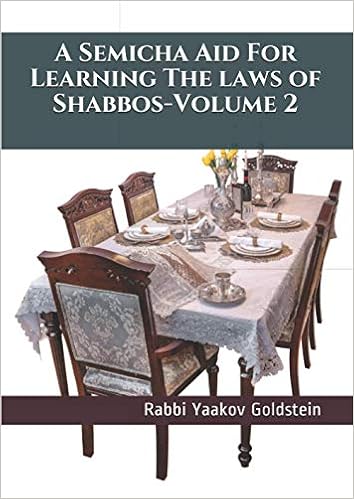

To purchase this Sefer, click here
The laws of Crushing, grinding, mashing, and cutting
Introduction:
The following section will deal with the laws of grinding on Shabbos. Different foods have different laws regarding if and how they may be grinded.
The Av Melacha:
Grinding was one of the principal actions done in the Mishkan[1], as in the Mishkan they would grind the herbs to use to make dye.[2]
Toldos:[3] The following actions are a subcategory of this principal prohibition: Cutting a vegetable very thin, cutting wood into very thin pieces in order to use to ignite a fire or in order to make a vessel, one who crumbles a thick piece of dirt in order to make a use with the crumbs.
When does the prohibition apply?
Nonfoods:
According to all, the grinding prohibition applies to non-food products[4], such as grinding wood[5], or earth[6] and the like. This applies even if the product does not grow from the ground.[7]
Foods:
Some Poskim[8] rule the Grinding prohibition does not apply to foods. Other Poskim[9] rule it only applies to foods that one plans to cook. Other Poskim[10] rule it applies to even raw foods. The Shulchan Aruch rules like the latter opinion.
Foods that do not grow from the ground:
Some Poskim[11] rule the Grinding prohibition does not apply to foods that do not grow from the ground.[12] Other Poskim[13] rule the Grinding prohibition applies even towards foods that do not grow from the ground. The Shulchan Aruch rules like the former opinion.
In proximity to the meal:
Some Poskim[14] rule foods may be cut small in proximity to the meals. Other Poskim[15] rule it may not be cut small in proximity to the meals. It is disputed as to when this allowance applies even according to the lenient opinion.[16]
If one does not need the item:[17]
The grinding prohibition only applies when one needs to use the ground item.
Grinding with Shinuiy:
See Halacha 1A
Grinding with hands:
See Q&A below.
______________________________________________________
[1] Mishneh Shabbos 73a
[2] Rashi 49b and ibid
[3] Iglei Tal Tochein 3; Ketzos Hashulchan 129 footnote 1
[4] See Toras Hamelachos Tochein 1-4
[5] Shabbos 74b; Admur 314:16; M”A 314:14; Taz 501:2
[6] Admur 302:17; P”M 321 M”Z 10; Iglei Tal Dash 7:8
[7] This applies even according to the Terumos Hadeshen; See Tehila Ledavid 321:12 that by non-food products one is liable even if it does not grow on the ground; Iglei Tal Dash 7:7 that earth is similar to the dyes and one is hence liable.
[8] Tosafus 74a; Rabbeinu Chananel and Rosh; brought in M”B 321:31]
[9] Rambam 21:18 as explained in Beis Yosef 321
[10] Rashbam; Hagahos Maimanis; Semag; Ran; Mordechai; Yireim and Rashba
[11] Terumos Hadeshen 57
[12] The reason: As we rule regarding Meameir that it only applies to Gidulei Karka, and the same applies to Techina. [ibid]
[13] Shiltei Giborim 32 in Rif]; Rivash 184; Nishmas Adam 17:2; Kaf Hachaim 321:52; Chazon Ish 57
[14] Admur ibid; Rama 321:12; Rashba and Ran; See Ketzos Hashulchan 129 footnote 3 which learns that the same laws which apply to allow one to do Borer apply here as well, as by both cases the permission is based on that it is done in the way of eating. Thus, to grate vegetables using a designated vessel for grating would contain a Biblical prohibition according to all, just as is the law by Borer.
[15] M”A 321; In name of Shiltei Giborim; M”B 321:45
[16] Some Poskim rule it does not apply to spices, or to crushing in a regular way. [Admur] Others rule it does apply. [M”B]
[17] Admur 302:17


Leave A Comment?
You must be logged in to post a comment.